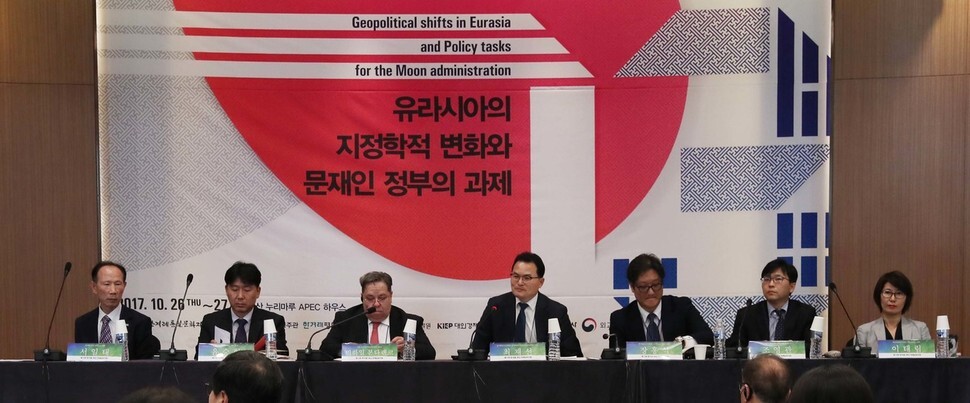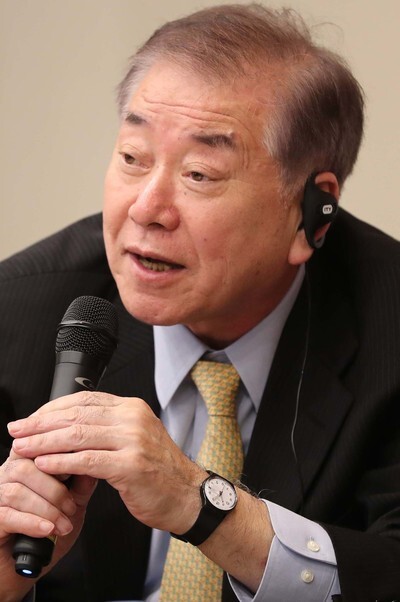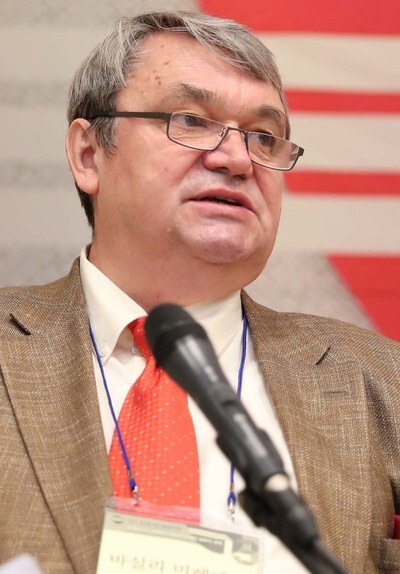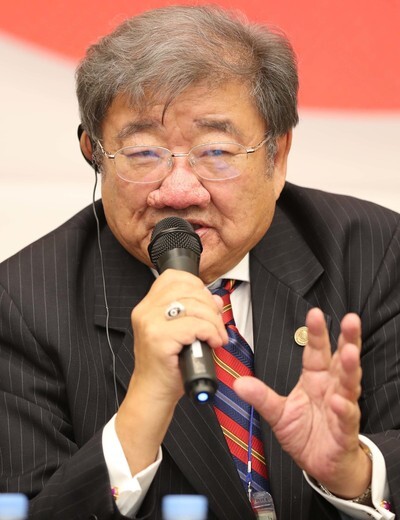hankyoreh
Links to other country sites 다른 나라 사이트 링크
Hankyoreh-Busan International Symposium sheds light on geopolitics in Eurasia

The Eurasian geopolitical environment is changing fast. China is pushing a so-called “Belt and Road” (land- and sea-based routes) initiative of using its historic Silk Road as a means of achieving development in its economically lagging western regions. Russia is ramping up its “New East Policy” to achieve development in its relatively lagging Far East. Recently the two countries, which share a long 4,300-km border, have been speeding up full-scale cooperation in areas such as transportation, distribution, resources, and energy.
■ New Cold War brewing for Eurasia?
While potential areas of conflict and competition remain, the Eurasian cooperation and integration approach forged by Beijing and Moscow is steering a new trend in international relations. As a result, the center of geopolitical dominance in the global order now appears to be shifting toward Eurasia. Yet the political situation on the Korean Peninsula remains entangled in the issue of North Korea’s nuclear program – unable to make progress for the last 20 or so years.
As it faces the North Korean nuclear riddle on top of a geopolitical upheaval in Eurasia, who should the Moon Jae-in administration be cooperating with, how, and from what perspective? It was to answer this question that “The Korean Peninsula and Strategic Cooperation between China and Russia” was selected as the topic for the opening discussion on Oct. 26 at the 13th Hankyoreh-Busan International Symposium at Nurimaru APEC House in Busan.
The discussion’s moderator, special presidential adviser for unification, foreign affairs and national security Moon Chung-in, posed three main questions to guests Punsalmaagiin Ochirbat, Mongolian’s first President, and Vasily Mikheev, vice president of the Institute of World Economy and International Relations at the Russian Academy of Sciences. First, he noted that “recent trends suggest the possibility of a new Cold War order taking shape in Eurasia around the North Korean nuclear issue” - a reference to how Pyongyang’s nuclear and missile provocations have recently resulted in the Korean Peninsula’s political situation shaping into a clash between the “northern” side (North Korea, China, and Russia) and the “southern” side (South Korea, the US, and Japan).
“The Cold War system is now over, and there are no longer Cold War elements,” Ochirbat said in response.
“We need to find a new path toward peaceful cooperation and development based on mutual understanding,” he continued, adding that he saw the approach as “applicable to the entire world, including Northeast Asia.”
Mikheev stressed that there were “no ideological differences between the Russian and Chinese side and the US like there were during the past Cold War.”
“That said, there could be conflicts due to differing positions on how to uphold the countries’ political interests in various regional issues,” he added.
■ Prospects for the NK nuclear issue
The discussion turned to the North Korean nuclear issue, which has geopolitically handcuffed the Korean Peninsula. Ochirbat said North Korea’s nuclear program “has not been developed for preemptive use.”
“For North Korea to use nuclear weapons first would be suicidal. North Korea will not use nuclear weapons first,” he declared.
“North Korea’s nuclear weapons are intended to intimidate the US and South Korea, but it will not actually use them.”
The participants differed in their views on the chances of North Korean abandoning its nukes. Mikheev noted that Pyongyang has “announced its intent to ‘acquire US-level nuclear capabilities’ not only in its Constitution but also at a Korean Workers’ Party Central Committee plenary session held in early October.”
“For North Korea to give up its nuclear weapons would be a violation of its Constitution and state policy goals, posing a threat to the Kim Jong-un regime,” he said, suggesting Pyongyang is unlikely to trade away its nuclear weapons for a US pledge to guarantee its regime’s security. Ochirbat agreed that North Korea “does not seem likely to give up its nuclear weapons any time soon.”
“Since its motivation to possess nuclear weapons is in response to a threat, it is going to want to maintain its current policies until there is a proposal to minimize it,” he predicted.
But Ochirbat also suggested a possibility Pyongyang could opt for a different path from its current one. “Politics and policies are the work of people. If the political situation changes, policies will change too,” he said.
■ Pres. Moon’s “New Northern Policy”
During a keynote speech for the third Eastern Economic Forum in Vladivostok last July, President Moon Jae-in outlined his vision for a “New Northern Policy” involving increased Eurasian economic cooperation with Russia’s Far East, China’s three northeastern provinces, Mongolia, and the countries of Central Asia.
“When it sees the success of economic cooperation in the Far East, North Korea will realize it is in its interest to participate and understand that this is a path for it to prosper peacefully without nuclear weapons,” he predicted at the time.
Is Moon’s policy vision practicable without a change in the North Korean nuclear situation? Ochirbat said he was viewing developments with Moon’s proposal “with interest.”
“[North Korean leader Kim Jong-un] has been proclaiming a two-track path of nuclear and economic development. I think that from the North’s standpoint, they may be able to discuss economic cooperation, and considerable progress could be achieved,” he predicted.
Mikheev said multilateral cooperation by Mongolia, China, and Russia and joint South Korea-Russia projects such as a North Pole sea route “have prospects and are possible.”
“There aren’t any political factors getting in the way,” he said.
But Mikheev also stressed that “large-scale projects like linking a Trans-Korean Railroad (TKR) to the Trans-Siberian Railroad (TSR) or connecting gas pipelines are out of the question right now.”
“Cooperation will only be possible if North Korea adopts Chinese-style market openness and democratic reforms,” he predicted.
By Kang Tae-ho, Director of Hankyoreh Peace Institute and Jung In-hwan, staff reporter
Please direct questions or comments to [english@hani.co.kr]

Editorial・opinion
![[Column] Season 2 of special prosecutor probe may be coming to Korea soon [Column] Season 2 of special prosecutor probe may be coming to Korea soon](https://flexible.img.hani.co.kr/flexible/normal/500/300/imgdb/original/2024/0426/3317141030699447.jpg) [Column] Season 2 of special prosecutor probe may be coming to Korea soon
[Column] Season 2 of special prosecutor probe may be coming to Korea soon![[Column] Park Geun-hye déjà vu in Yoon Suk-yeol [Column] Park Geun-hye déjà vu in Yoon Suk-yeol](https://flexible.img.hani.co.kr/flexible/normal/500/300/imgdb/original/2024/0424/651713945113788.jpg) [Column] Park Geun-hye déjà vu in Yoon Suk-yeol
[Column] Park Geun-hye déjà vu in Yoon Suk-yeol- [Editorial] New weight of N. Korea’s nuclear threats makes dialogue all the more urgent
- [Guest essay] The real reason Korea’s new right wants to dub Rhee a founding father
- [Column] ‘Choson’: Is it time we start referring to N. Korea in its own terms?
- [Editorial] Japan’s rewriting of history with Korea has gone too far
- [Column] The president’s questionable capacity for dialogue
- [Column] Are chaebol firms just pizza pies for families to divvy up as they please?
- [Column] Has Korea, too, crossed the Rubicon on China?
- [Correspondent’s column] In Japan’s alliance with US, echoes of its past alliances with UK
Most viewed articles
- 1[Column] Season 2 of special prosecutor probe may be coming to Korea soon
- 2‘We must say no’: Seoul defense chief on Korean, USFK involvement in hypothetical Taiwan crisis
- 3No good, very bad game for Korea puts it out of Olympics for first time since 1988
- 4Is Japan about to snatch control of Line messenger from Korea’s Naver?
- 5Division commander ordered troops to enter raging flood waters before Marine died, survivor says
- 6Is N. Korea threatening to test nukes in response to possible new US-led sanctions body?
- 7Korea’s 1.3% growth in Q1 signals ‘textbook’ return to growth, says government
- 8N. Korean delegation’s trip to Iran shows how Pyongyang is leveraging ties with Moscow
- 9[Editorial] Korea’s surprise Q1 growth requires objective assessment, not blind fanfare
- 10Amnesty notes ‘erosion’ of freedom of expression in Korea in annual human rights report